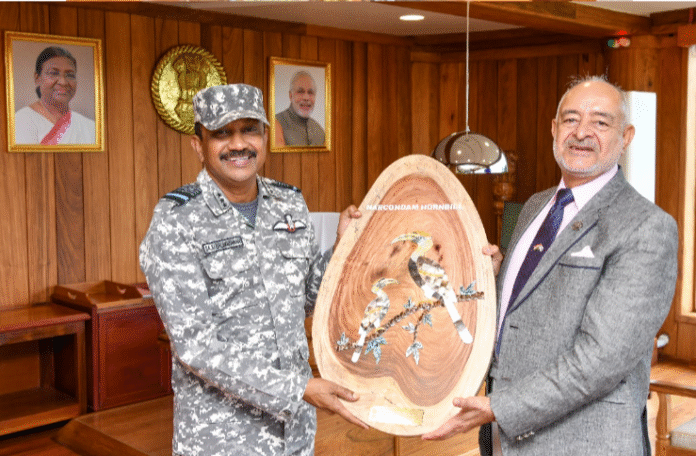A two-year military stewardship that blended flight decks, jungle drills and under-sea listening posts drew to a dignified close on 30 May 2025 when CINCAN Saju Balakrishnan walked the polished corridors of Raj Niwas for a farewell call on Lieutenant Governor D K Joshi. The brief meeting capped a tenure clocking two years and one month, book-ended by pandemic recovery on one side and renewed Indo-Pacific flux on the other.
Balakrishnan, who superannuates this week, leaves the tri-service Andaman & Nicobar Command after overseeing joint logistics upgrades and high-tempo maritime patrols that knitted the island outpost tighter into India’s wider naval grid. During his stint, the command’s integrated theatre exercises doubled, and runway extensions at Car Nicobar and Campbell Bay improved quick-reaction footprints for fighters and heavy airlift alike.
At Raj Niwas, the Lieutenant Governor thanked the outgoing air marshal for what the administration terms “unfailing and pragmatic support,” a nod to disaster-relief sorties during last October’s twin-cyclone scare and navy-air force-coast-guard synergies that sliced evacuation lead times. While cameras clicked, the two men exchanged mementoes, standard service practice but also a symbolic hand-off of island guardianship to the civilian establishment until a successor takes charge.
No public statement laid out Balakrishnan’s next chapter, though peers expect the decorated pilot to pivot to war-college lectures and aerospace think-tank work. His predecessors have written memoirs framing the islands as India’s “unsinkable aircraft carrier”; his own diaries, insiders say, dwell on cyber-linked challenges such as real-time data-fusion.
The command he leaves behind faces salted winds in both literal and strategic sense. As maritime contestations swirl from Malacca to the Bay of Bengal, the islands host listening arrays critical for early submarine detection. Balakrishnan’s term saw calibration of these sensors and trial integration with mainland fusion centres, compressing response calculus for surface fleets.
Beyond the grey hulls, local residents, about 400 thousand across the territory, felt his tenure most during amphibious community outreach. Military medics treated remote Nicobarese hamlets, telecom detachments restored connectivity after storm-snapped towers, and logistics lorries hauled medical oxygen during 2024’s flu surge. The Lieutenant Governor’s note of gratitude singled out these civilian-facing missions as the cooperative template future commanders must uphold.
His exit dovetails with upcoming naval aviation transitions: the incoming CINCAN will inherit induction schedules for new long-range drones and mid-life upgrades for Dornier surveillance craft. Military observers credit Balakrishnan for streamlining maintenance supply chains, ensuring spare parts reached the archipelago without weather-induced lags that dogged previous deployments.
For uniformed personnel stationed across scattered islets, farewell season carries echoes of continuity. Traditions prescribe that each outgoing commander leaves a concise brief, dubbed the “island docket”, for successors, outlining terrain quirks, liaison hierarchies and priority drills. Balakrishnan’s docket reportedly emphasises civil-military disaster synergy, an area where his rapport with Raj Niwas proved decisive.
While headquarters brass parse his legacy in statistics, sortie counts, fuel savings, accident-free hours, port-side vendors recall simpler metrics: faster base permits, smoother entry roads, and community concerts timed for island festivals. At Haddo Wharf, a fish seller who once catered to combined-exercise dinners summarised it: “He kept the runway clear and the market open.”
As dusk shadows lengthened over Phoenix Bay’s anchored patrol craft, service buglers rehearsed the farewell calls that would punctuate Friday’s ceremonial guard of honour. Balakrishnan’s last walk down the parade line will trigger the command’s routine transition protocol, with the senior-most flag officer holding interim charge until a formal appointment lands from Delhi.
In military parlance, a change of command is both an ending and an unbroken relay. By saluting the Lieutenant Governor, the outgoing air marshal formally returned island stewardship to civilian hands, just long enough for the next CINCAN to sign in and take the watch. The ocean, indifferent to such ceremonies, lapped against Ross Island’s breakwater, plotting its next test.





